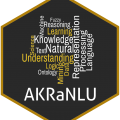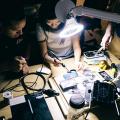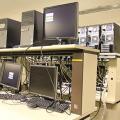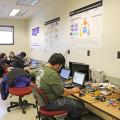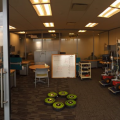Because our majors benefit from hands-on experiences to to assist in their learning, they need up-to-date labs and research facilities. Each department maintains and updates its learning facilities to provide real-world and technology experiences for their students. In addition, certain labs were created to focus on one type of research, led by faculty in the department.
Facilities
West Lafayette
Design and implement natural language-base technologies that enable people to communicate with computers informally, using a natural language, with the full understanding of what is said, and perhaps more importantly, of what is left unsaid.
Purdue’s Cloud-native, Cyberinfrastructure and Networks Laboratory (CYAN Lab) investigates a broad range of research problems in network systems, including software-defined and programmable networks, network virtualization, and cloud-native infrastructure. The CYAN Lab focuses on fundamental and applied research in computer networks and cloud-native infrastructure. Our experimental design, implementation, and evaluation of networked systems enable the developing of novel applications and communication ecosystems.
The Purdue University Cyber Forensics Lab is a national academic leader in Education & Training, Applied & Basic Research, and Investigative Support of Digital Forensic Science. Our strengths lie in the applied research and technological solutions for the technical and theoretical challenges that exist in our specific domains.
Cyber-Physical-Social Systems Design Lab focuses on exploring the integration and interaction between the cyber, physical, and social components in the critical infrastructures and developing new-generation AI-enabled security and privacy solutions.
The Data Analytics, Technologies, and Applications (DATA) lab seeks to leverage data science to enable advancements in discovery in a variety of disciplines.
The DAO2 lab innovates and applies artificial intelligence to solve real world problems using a data driven approach.
The Purdue Computer and Information Technology High Performance Computer and Cyberinfrastructure Laboratory (HPC-CRL) is a focal point for education, research, and collaboration in the development, deployment, and use of supercomputing, grid computing, and cyberinfrastructure.
INtegrated Smart Energy Technology lab (INSET)- provides a shared space that supports the understanding and learning of the electrical Smart Grid - a system that interconnects the electricity distribution grid with two-way communications to provide energy monitoring and management for the power industry and consumers.
The Network Administration & Security Lab offers students an environment where they are able to explore as well as develop the skills and knowledge in order to create new technologies, new innovations in order to increase efficiency and safety for individuals.
A proper design can offer many benefits like security, accessibility, usability, speed, redundancy and scalability. The Network Infrastructure Design & Deployment Lab provides students with an environment where they are able to explore as well as develop the skills and knowledge in order to create new processes, new innovations in order to increase efficiency and performance.
The NIPA Capstone Lab provides students with an environment where they can explore as well as develop the skills and knowledge in order to create new technology, new innovations to improve the lives of individuals.
The Purdue Homeland Security Institute was established in response to the events of September 11, 2001 with the charter to help our nation prevent, protect, respond and recover from any threat or action taken against our homeland. Today, we fully embrace the principles outlined in the National Response Framework as we work daily to identify and confront the myriad of homeland security challenges our nation faces. We then pursue solutions using the power of inter-disciplinary discovery, learning, and engagement here at Purdue University and apply that knowledge across the State of Indiana and the nation.
Our research approach is guided by theoretical and methodological frameworks that allow the study of collective knowledge and cultural dynamics within educational settings. Therefore in our investigations, we employ constructivists and constructionist discourses that allow the study of phenomena in naturalistic learning environments.
The Smart Machine & Assistive Robotics Technology (SMART) Laboratory at Purdue University explores human-robot interaction, multi-robot systems, and robotic sensor networks with emphasis in field and service robotics and assistive technology and robotics.
The Ubiquitous and Mobile Investigative Techniques and Technologies (UMIT2) Lab dedicates itself to the pursuit of digital understanding, the safeguarding of user security and privacy, and the advancement of Digital and Cyber Forensics. We identify, analyze, and expose both flaws and abuses in technologies, with a focus on educating users and providing investigative guidance to law enforcement.
Wireless networks can make delivery of high-demand technologies like broadband Internet access, voice over IP, video services, security surveillance and E1/T1 capabilities both faster and significantly less expensive. In the Wireless Network Applied Research Lab, through hands-on lab experiences and experimentation, students learn how to evaluate technical performance criteria, make comparisons among different systems, and match systems and equipment to the unique application needs of an organization’s users.

